Platform
Use Cases
Many Possibilities. One Platform.
AI and Automation
The Always-on Incrementality Platform
Solutions
Teams
Built for your whole team.
Industries
Trusted by all verticals.
Mediums
Measure any type of ad spend
Use Cases
Many Possibilities. One Platform.
AI and Automation
The Always-on Incrementality Platform
Teams
Built for your whole team.
Industries
Trusted by all verticals.
Mediums
Measure any type of ad spend

It’s been 2.5 years since Apple released iOS14.5 disrupting user level data access, and throwing app developers into a chaos of being unable to track performance they were used to.
Performance tracking used to be a simple process of connecting between a user install to the ad-platform the user saw or clicked an ad last.
I won’t elaborate on this article about the limitations of this approach to measurement. If you want – we have a white paper specifically about this topic.
Apple’s announcement created a new paradigm. User level data will only be made available if users explicitly say that they allow a developer to track them. The consent rate is pretty low given this phrasing and choice offered to users.
App developers who continue relying on the same tools they used to, are making data driven decisions based on bad data.
The data we have shows a pretty bad picture for those who continue relying solely on attribution data. While attribution is and always has been a very powerful tool for some decisions – using attribution data for performance marketing on iOS completely distorts performance reporting. This problem is enhanced across some of the best advertising platforms, as those had to rely on the privacy compliant measurement introduced by Apple: SKAdNetwork
Today, we live in a world where attribution data on iOS is simply off. When we analyze and compared the channel level attributed results for 11 different app developers across iOS and Android, we see an average difference of 393%
This means that while the average Attributed Cost per Install across Android is $1.49 , the average Attributed Cost per Install across iOS stands at $7.35!
While performance marketing has always more expensive across iOS, it was never to the point of being 4x more expensive to acquire users.
The chart below shows the average attributed cost per install of Android vs. iOS.
Not surprising, App Developers have been making bad decisions when using this data. It is only natural for a developer to turn off channels with a CPI of +$40 and prioritize channels with CPIs of under $2
However – when doing so – app developers saw deteriorating results overall. They had reporting showing them they made the “right” decision, but reality proving otherwise.
The past 2.5 years have been a crazy ride for us here at INCRMNTAL. When we launched our company, we already understood the value in incrementality measurement, however, when Apple announced the demise of IDFAs, our product became a MUST-HAVE for any company marketing an app. Without it – companies continue making decisions based on wrong metrics, leading a lot of companies to need to cut spends, or cut costs altogether.
Incrementality adjusted CPIs show app developers the true value of their marketing spends, without requiring user level data.
When we compare the incrementality adjusted CPIs for the same 11 developers as above, the true value of ad spend on iOS shows a completely different picture than what attribution has to say. While iOS continues being more expensive than Android, a difference of 19% is more appropriate, reasonable, and operational, than the 4x the CPI attribution data presents.
The chart below shows the attributed CPI in comparison with the incrementality adjusted CPI. A metric that is available throughout the INCRMNTAL platform.

The ad platforms that got affected the most by Apples’ change were the leading platforms: Google Ads, Facebook Ads. These Trillion dollar companies could not afford to go against Apple’s privacy policies and consider using fingerprinting, risking to get banned from the App Store. Hence these platforms exclusively rely on Apple’s privacy compliant method of measurement: SKAdNetwork. And while these platform have to play by the rules – other ad platforms with less scrutiny continued “enjoying” (or: exploiting) fingerprinting attribution, thus, winning more conversions and appearing to generate better performance than the largest platforms.
While some of the ad networks, DSPs, and ad platforms do generate value, they are cannot be a replacement for the power of Google Ads (a platform that targets intent), or Facebook Ads (a platform that knows everything about their users).
However, with less scrutiny by Apple – the smaller ad platform allowed themselves to continue utilizing fingerprinting, which in result, enabled these to win credit for conversions only thanks to the “benefits” of how attribution using fingerprinting works.
Advertisers removing Google and Facebook from the mix due to the reported “bad results” often did not realize why their overall performance started to deteriorate.
Like a basketball team, removing the player that had the most assists – will cause the team to lose the game, even if this player did not score at all themselves.
Privacy eliminated this data point, causing companies to make terrible optimization decisions.
Often, these decisions only came into challenge when it was too late – after the company had burned months of ad spend in the wrong places.
Incrementality was a game changer to those that adopted it earlier than others. Incrementality doesn’t measure individual player statistics, but the overall team success. Incrementality is about causality – the team won in these scenarios. The team lost in these scenarios. Measuring Value. Not clicks.
We are months away from Privacy Manifest, and the Android Privacy Sandbox.
It’s been over 2.5 years since ATT.
If you haven’t woken up yet and started utilizing incrementality for value measurement – now is the time.

Maor is the CEO & Co-Founder at INCRMNTAL. With over 20 years of experience in the adtech and marketing technology space, Maor is well known as a thought leader in the areas of marketing measurement. Previously acting as Managing Director International at inneractive (acquired by Fyber), and as CEO at Applift (acquired by MGI/Verve Group)